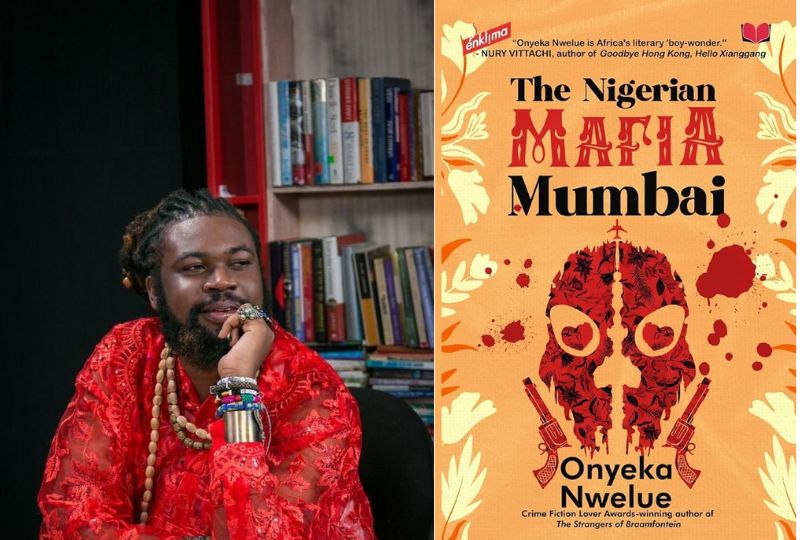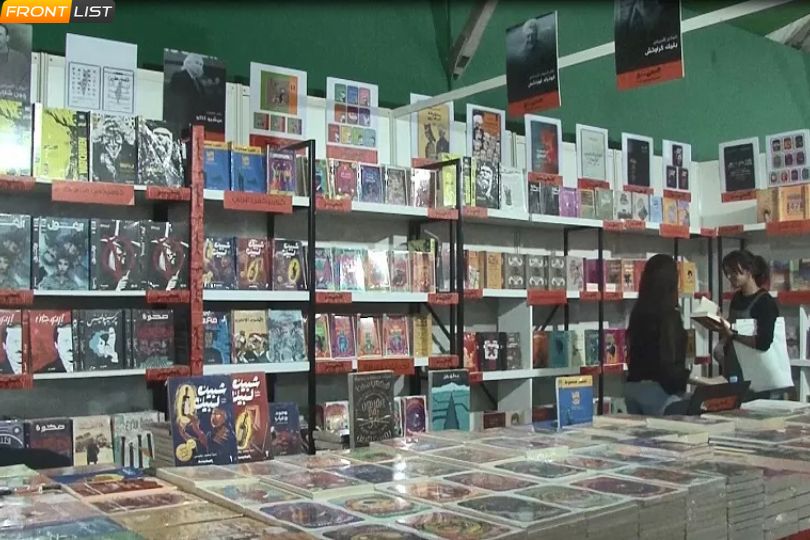Interview with Onyeka Nwelue Author of “The Nigerian Mafia Mumbai”
Discover the authorial insights of Onyeka Nwelue in an interview about 'The Nigerian Mafia Mumbai' on Frontlist. Explore the world within his latest creation.on Dec 05, 2023

Onyeka Nwelue is a Nigerian filmmaker, talk-show host, bookseller and author whose book, Hip-Hop is Only for Children won the Creative Non-Fiction Book of the Year at the 2015 Nigerian Writers’ Awards. He adapted his novella, Island of Happiness into an Igbo language film, Agwaetiti Obiụtọ and won Best Feature Film by a Director at 2018 Newark International Film Festival, and went on to be nominated for Best First Feature Film by a Director and the Ousmane Sembene Award for Best Film in an African Language at the 2018 Africa Movie Academy Awards.
He is the director of the Oxford-based James Currey Society and founder of La Cave Musik, a record label, based in Paris.
Frontlist: It was mentioned that your travel experiences inspire your book. Could you share some specific travel stories or moments that inspired elements of your book? What aspects of your journeys contributed to the creation of this story, and when did you decide to turn these experiences into a full-fledged story?
Onyeka : I came to India for the first time as a teenager. Since then, I have been a regular visitor to India. I consider India my second home. India has a sizeable immigrant Nigerian and African community, and for me, the experiences of these immigrants are relatable.
During my visits to India, I have run into stranded Nigerians on the streets of Delhi and Mumbai. Sometimes, my curiosity gets the better of me, and I find myself buying them food and drinks and listening to their stories.
Surprisingly, all these stories are mostly the same; they left Nigeria with hopeful dreams and the promise of escaping economic hardship; they chose India as a travel destination because it is comparatively easier to get an Indian visa than get an American, Canadian, or Schengen visa; the people who promised to accommodate or help them find their feet in India either ghosted them, exploited them or got tired of housing them for free after a few days; they are considering a life of crime rather than go back to a Nigeria that they had bid goodbye to.
There is no singular experience that advised my decision to write 'The Nigerian Mafia: Mumbai'; instead, it is a summation of stark realities that had, over the course of my frequent visits, confronted me, asking to be talked about. As much as I can tell, these are the main contributors that informed my decision to write this story.
Frontlist: Your book delves into the challenges immigrants face in India. Do you believe these issues mirror the real experiences of people, and do you think the conditions for immigrants in India are indeed challenging? What led you to address these difficulties in your storytelling?
Onyeka: I know for sure that my book mirrors the real experiences of people – but then, it mirrors only a small aspect of people's experiences in India. And by 'people' in this context, I mean 'immigrants in India', mainly African and Nigerian immigrants. Fiction, after all, mirrors reality. This is the whole essence of literature: to magnify a neglected aspect of our overall life so that we can better understand ourselves and relate better with ourselves and the world around us.
I was led to address the difficulties in the life of immigrants in India because I wanted to entertain them in a very realistic and relatable manner. To be honest, I never set out to drive home any lessons. It should be up to the reader to decide whether there is any moral or social value in the book they just enjoyed reading.
Frontlist: In your book, you mentioned that Uche comes to India seeking better roles in Bollywood but ends up in unexpected situations. What drove his character transformation and the unforeseen circumstances? What inspired you to explore this shift from ambition to unexpected reality in your storytelling?
Onyeka: Uche's condition is no different from a lot of talented people I have met and spoken with. You see, arts and the pursuit of art is a task that demands a certain kind of grit that is uncommon. It is this grit that separates the successful ones from the wannabes.
Fuelled by big dreams, Uche sees an opportunity to make easy money. And like most emerging talents that litter every corridor of success, he chose the easy way out. Look closely at any creative industry and you will see an Uche who took a detour to make some money, to seek some stability, with the hope of returning someday to the road of artistic pursuits. But then you know how one road always leads to another, and before you realize it, that road of artistic pursuits becomes a faded memory, and you are too far gone along your way to retrace your steps.
I have met a lot of Uches in the course of my pursuits in film, music, and literature, and they are my inspiration for this character.
Frontlist: How did you keep readers emotionally connected to Uche, despite his morally complex and illegal actions in the story? What techniques did you use to maintain this connection?
Onyeka: I made sure not to use a lot of flashbacks. This is a technique that I have found useful in keeping a story riveting. But most especially, it is a most relatable story, and that does the magic.
Frontlist: In your book, the main character resorts to illegal activities for survival. Do you believe such actions can be justified when someone is in desperate need, or do you think there are always alternative options to choose the right path?
Onyeka: This is a difficult question and I will try to do justice to it. Even though we might want to zero in on the individual – Uche in this case – but I would prefer that we take steps back and attempt a holistic view on this matter. The society should also be placed in the dock. Now, we can begin.
It is criminal on the part of any society to place a man in a position where he is desperate to provide for his basic needs. Everyone deserves to be free of poverty and to have their basic needs met so that they can devote their time to elevating the state of being of the humans in their various societies.
I will never hold brief for criminality. However, in my conversations with desperate immigrants, I have realized that they never set out from their countries to commit a crime. They never envisaged desperation when making plans for their travel destinations. But they came, they saw, and they chose the easy way out, and of course, with the attendant consequences in waiting.
Yes, there are alternative options to choose the right path. And that takes us to grit which I earlier talked about. Not everyone has it, and it is the one thing that separates the truly successful ones from the wannabes.
Frontlist: As 'The Nigerian Mafia: Mumbai' is the first book in a ten-book series, can you provide some insights into what readers can expect from the upcoming books in the series? Will they be a continuation of this story or explore new cities and settings?
Onyeka: The second book in the series is 'The Nigerian Mafia: Sao Paulo'. Next is 'The Nigerian Mafia: Johannesburg' and 'The Nigerian Mafia: Freetown'. Each book is a continuation of the story that begun in Mumbai, with Uche being the protagonist embroiled in the immigrant crime underbelly in each one of these cities.
Readers should expect more action and suspense. My South African publisher has already fallen in love with 'The Nigerian Mafia: Johannesburg' and my Brazilian friend, who is also an academic, thinks that 'The Nigerian Mafia: Sao Paulo' is the most riveting novel she has read in a long time. 'The Nigerian Mafia Sao Paulo' will be released in February 2024, and I am excited about it.



.jpg)






.jpg)

.jpg)

.jpg)
.jpg)
.jpg)
.jpg)










Sorry! No comment found for this post.